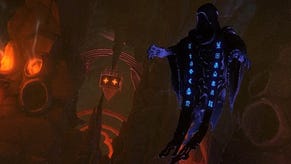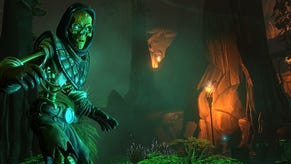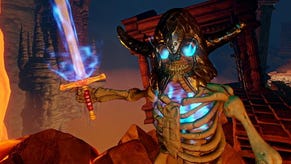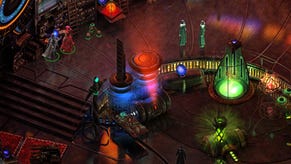Underworld: Ascendant Wants To Let You Improvise
Creative solutions
Oh goodness me. If Underworld Ascendant [Kickstarter] can at least match my hazy, confused memories of Ultima Underworld 2, the first game I ever played on my dad's PC, then I'll be a happy bunny. If it can match what's being said by the team about their "improvisation engine", then my jaw will hang agog. They are, it seems, attempting to create a setting where you'll be able to - at least feel like you can - approach scenarios in your own way. Hmmm. It's a claim I've heard a lot of times before, but heck, if I had to pick who was make it happen, I'd likely choose former Looking Glass members. Talking of whom, Warren Spector shows up in a new video, reminiscing on the original games.
The motive behind the improv options is to capture the sense of a pen-n-paper D&D session, where your own crazy schemes aren't limited by what's been programmed. Of course, common sense suggests it will be only a sense. It's hard to imagine the game offering ways out of trouble as silly as Graham, Marsh Davies and I come up with for the trouble Jim sets up for us on Thursday evenings. Trying to throw halfling Graham across a pit, while tied to a rope, wasn't our most successful solution, especially when after two failed attempts and a very bruised Graham, we remembered he could teleport. For instance. But the video shows how objects within the world can be destroyed rather than take on tricky fights, or how specialist skills can be deployed to find novel ways around challenges. They describe it, in a press release, like this:
"In Underworld Ascendant, instead of the designers scripting a set solution path for a player, the Improvisation Engine puts the problem solving in the player's hands.
"Our designers lay out an encounter; setting up the monsters, traps, the physical layout, and the like. Then the world simulation is turned on. A set of fairly complex interactions and dynamics take place of their own accord. The player comes into this dynamic mix, and can permeate this situation in whole range of ways, some of which the designers may have never imagined."
I think what comes across as the most important point is their desire to have the game adapt itself to still be approachable whichever way you've chosen to specialise your character. The example they use is a player who's picked athletics and acrobatics over strength and combat skill, and being able to use this to evade a fight, rather than haplessly flail within it. They also go on to make some other more standard claims, such as your behaviour having significant effects on the world, including which creatures thrive, what conversations you'll have, and the way NPCs feel about you.
Of course, whether any of this can really be delivered is rather dependent upon the Kickstarter being a success. They're halfway through their time, with nearly 5/6ths of the money raised, so it seems likely they'll make it to their basic goal. But I imagine there's some surprise and disappointment amongst the team that nostalgia for the (truly fantastic) series, and excitement for a proper Looking Glass founder at the helm - Paul Neurath - wasn't enough to see it go rocketing past in the early days of the campaign. Still, let's hope they can achieve their aims within this budget.
To find out more about the plans for the game, you can read Adam's interview with Paul Neurath.










